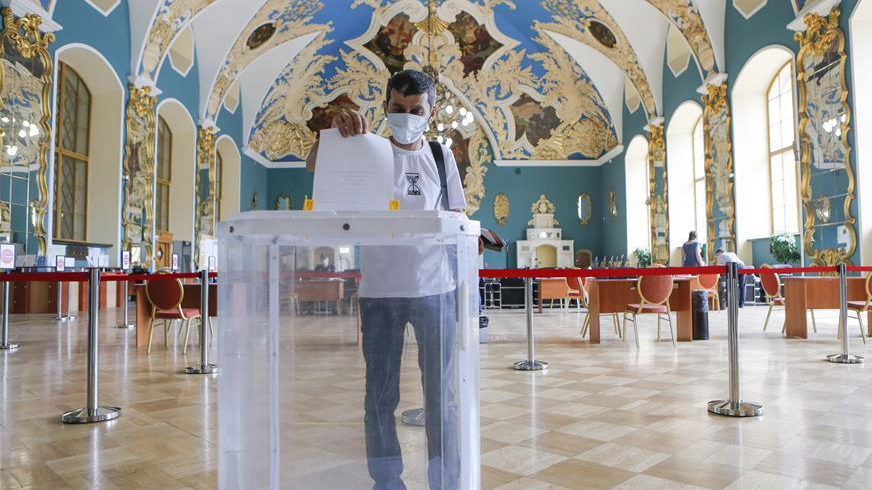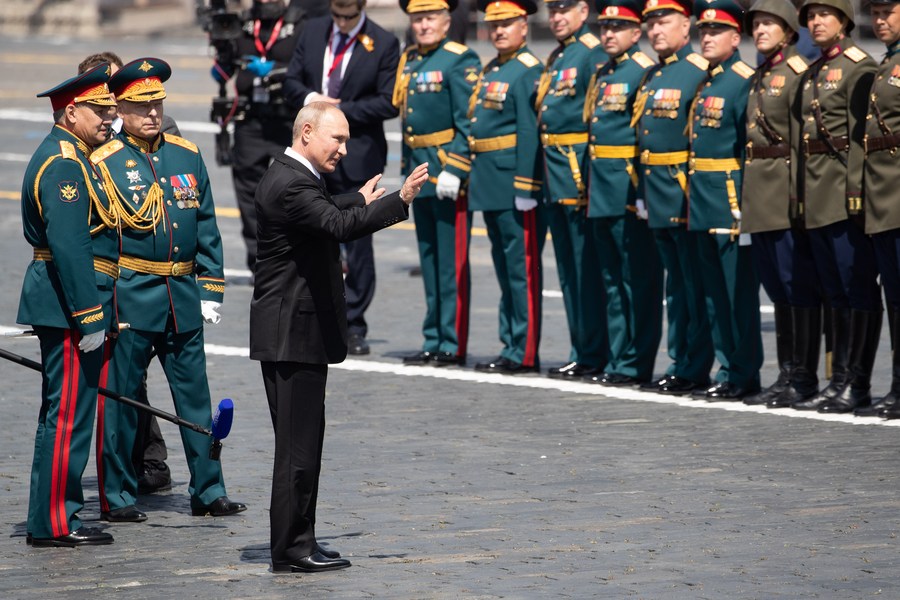
A voter wearing a face mask casts his ballot at a polling station in Moscow, Russia, June 28, 2020. /Xinhua
A voter wearing a face mask casts his ballot at a polling station in Moscow, Russia, June 28, 2020. /Xinhua
Editor's note: Nikola Mikovic is a freelance journalist based in Serbia. He covers mostly Russian, Ukrainian and Belarusian foreign policies, and writes for multiple web-magazines. The article reflects the author's opinions, and not necessarily the views of CGTN.
Russians are voting on amendments to the country's constitution.
Critics claim that the only point of the plebiscite is to allow President Vladimir Putin to stay in power until 2036, while the Kremlin officials assure that the amended basic law will bring significant changes to Russian society.
Russia's State Duma (Russian parliament) already approved the changes to the constitution in March, and although a vote is not legally required, Putin is seeking "popular support" amid his approval ratings decline.
According to recent polls, his 59 percent approval rating is his lowest in years. Also, according to a most recent survey conducted by Russian liberal, pro-Western opposition, 33 percent of the Russian population would not approve the constitutional changes, while 44 percent would vote in favor of the amended constitution.
The opposition media claim that 48 percent of Muscovites do not approve the idea of the reset of Putin's four previous terms as president, allowing him two additional six-year terms from 2024-2036.
Even Gennady Zyuganov, leader of the Russia's Communist Party, which is the major parliamentary opposition group, strongly opposes the constitutional changes. He claims that the main proposals of the Russian communists were ignored by the pro-Putin, ruling United Russia party.
"Today, the president of Russia has more powers than the tsar, pharaoh and Soviet general secretary combined. It is unacceptable," said Zyuganov, complaining that the State Duma did not support the abolition of controversial pension reforms that saw retirement ages rise sharply in Russia.
Constitutional changes, however, would ensure that pensions rise over time and guarantee that the minimum wage does not fall under the cost of living. Still, most of these changes are not fundamentally new, and they merely transfer the norms already contained in existing federal laws to the constitutional level. This also applies to the most popular and at the same time most controversial amendments, such as clauses on inviolability of borders, or marriage as a union between a man and a woman.

Russian President Vladimir Putin delivers a speech following the military parade marking the 75th anniversary of the victory in the Great Patriotic War on Red Square in Moscow, Russia, June 24, 2020. /Xinhua
Russian President Vladimir Putin delivers a speech following the military parade marking the 75th anniversary of the victory in the Great Patriotic War on Red Square in Moscow, Russia, June 24, 2020. /Xinhua
As of early February, the commission on the constitutional reform has reportedly received as many as 300 amendment proposals to be added to the state's constitution. One of the ideas was to add a clause that should oblige the head of the state to protect Russian sovereignty and not to give away any territory.
It is worth noting, however, that President Putin and other Russian officials have been negotiating the status of the Kuril Islands – which have been an integral part of Russia for over 70 years – with Japanese leaders. It remains to be seen what will be their position regarding this part of Russia, once the constitution is amended.
The new constitution will also formally recognize Russia's status as a "victorious power" in World War II, but that will unlikely prevent the U.S.-backed Japan from demanding the return of the Kuril Islands. Instead, the Kremlin will still have to deal will growing pressure and sanctions from the West, particularly from the United States.
When the Russian constitution was adopted in the early '90s, it was written that international law was higher than Russian law. Once amended, the constitution is expected to take precedence over international law. Still, it remains to be seen how that will be implemented on the ground. In other words, if Russian officials keep making concessions to the West, arguing that they have to follow the international law, they will de facto violate the country's constitution.
Besides that, it is also unclear how the constitution will treat ethnic Russians, who make up 80 percent of Russia's population. They were not mentioned in the old constitution, and the amended basic law says that the Russian language is "the language of the state-constitutive people," which implicitly suggests that ethnic Russians are the ones who founded the country, although their status in the constitution remains imprecise.
Even though the new constitution will allow Putin to stay power for 16 more years, constitutional changes are expected to provide more power to the Russian parliament. The State Duma will be able to approve the candidates of the prime minster, deputy prime ministers and federal ministers, and the president will not be able to refuse their appointment, but in some cases will be able to remove them from office.
However, the amended constitution will provide the president with more power over the security forces, which is why some Russian opposition politicians claim that the basic law will "strengthen the presidential dictatorship and consolidate oligarchic domination."
Finally, once amended, the Russian constitution will strictly determine who can hold "important positions for ensuring the country's security." In other words, people who have foreign citizenship or a residence permit in other countries should not be allowed to serve as president, ministers, judges or heads of regions.
That will, however, not affect very influential Russian oligarchs who have dual citizenships. They may not be allowed to formally participate in the government, but they will certainly keep playing important roles behind the scene.
(If you want to contribute and have specific expertise, please contact us at opinions@cgtn.com.)